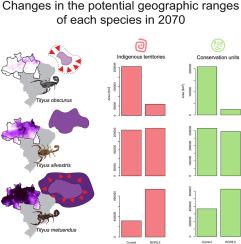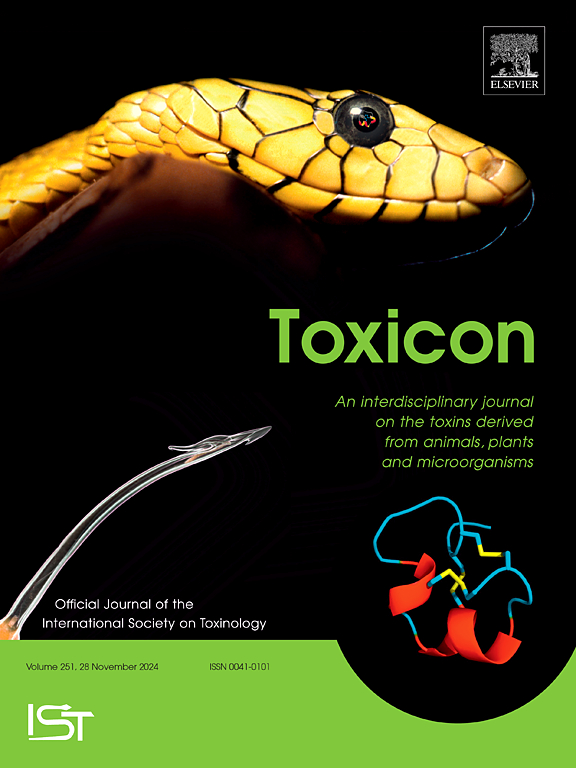Impact of climate change on the distribution of Tityus scorpions (Buthidae) in the Amazon: Implications for conservation units and indigenous territories
IF 2.4
4区 医学
Q2 PHARMACOLOGY & PHARMACY
引用次数: 0
Abstract
Climate change is altering the distribution of organisms, affecting ecosystem goods and services. These impacts can pose new challenges for public health due to shifts in the distribution of venomous animals, influencing the dynamics of envenomation incidents. The consequences of climate change are expected to be more severe in tropical regions, where the most vulnerable communities are located. In this context, the increase of scorpionism in recent decades across the vast Amazonian region of Brazil calls for an assessment of future risks. In this study, we analyze the effects of climate change by the year 2070 under different future scenarios (SSP2-4.5 and SSP5-8.5) on the distribution of the three most medically important scorpion species in northern Brazil: Tityus obscurus, T. metuendus, and T. silvestris. Additionally, we quantify the impact of these changes on conservation units and Indigenous territories. Our results indicate that the three species will respond differently to climate change. Tityus obscurus is projected to undergo a significant range contraction, T. silvestris will experience minimal changes, and T. metuendus will likely expand significantly into new areas. As a consequence of these shifts, T. obscurus may lose a large portion of its range within conservation units, potentially compromising the biotechnological potential of its venom. On the other hand, T. metuendus is expected to expand significantly into Indigenous territories, bringing new challenges to public health. Thus, climate change may have direct impacts on the health of the most vulnerable populations and on the conservation of species in northern Brazil, highlighting the need for strategic measures to mitigate these effects.

气候变化对亚马逊河流域蝎子分布的影响:对保护单位和土著领土的影响。
气候变化正在改变生物的分布,影响生态系统的产品和服务。由于有毒动物分布的变化,这些影响可能对公共卫生构成新的挑战,影响中毒事件的动态。气候变化的后果预计将在热带地区更为严重,那里是最脆弱的社区所在的地方。在这种背景下,近几十年来巴西广大亚马逊地区蝎子病的增加要求对未来的风险进行评估。在本研究中,我们分析了到2070年气候变化在不同未来情景(SSP2-4.5和SSP5-8.5)下对巴西北部三种最重要的医学蝎子(Tityus obscurus、T. metuendus和T. silvestris)分布的影响。此外,我们量化了这些变化对保护单位和土著领土的影响。我们的研究结果表明,这三个物种对气候变化的反应不同。据预测,隐天牛的活动范围将明显缩小,西林天牛的变化很小,而大尾天牛可能会向新的区域扩张。作为这些变化的结果,在保护单位内,暗色瓢虫可能会失去很大一部分活动范围,潜在地损害其毒液的生物技术潜力。另一方面,metuendus预计将大量扩展到土著领土,给公共卫生带来新的挑战。因此,气候变化可能对巴西北部最脆弱人口的健康和物种保护产生直接影响,突出表明需要采取战略措施来减轻这些影响。
本文章由计算机程序翻译,如有差异,请以英文原文为准。
求助全文
约1分钟内获得全文
求助全文
来源期刊

Toxicon
医学-毒理学
CiteScore
4.80
自引率
10.70%
发文量
358
审稿时长
68 days
期刊介绍:
Toxicon has an open access mirror Toxicon: X, sharing the same aims and scope, editorial team, submission system and rigorous peer review. An introductory offer Toxicon: X - full waiver of the Open Access fee.
Toxicon''s "aims and scope" are to publish:
-articles containing the results of original research on problems related to toxins derived from animals, plants and microorganisms
-papers on novel findings related to the chemical, pharmacological, toxicological, and immunological properties of natural toxins
-molecular biological studies of toxins and other genes from poisonous and venomous organisms that advance understanding of the role or function of toxins
-clinical observations on poisoning and envenoming where a new therapeutic principle has been proposed or a decidedly superior clinical result has been obtained.
-material on the use of toxins as tools in studying biological processes and material on subjects related to venom and antivenom problems.
-articles on the translational application of toxins, for example as drugs and insecticides
-epidemiological studies on envenoming or poisoning, so long as they highlight a previously unrecognised medical problem or provide insight into the prevention or medical treatment of envenoming or poisoning. Retrospective surveys of hospital records, especially those lacking species identification, will not be considered for publication. Properly designed prospective community-based surveys are strongly encouraged.
-articles describing well-known activities of venoms, such as antibacterial, anticancer, and analgesic activities of arachnid venoms, without any attempt to define the mechanism of action or purify the active component, will not be considered for publication in Toxicon.
-review articles on problems related to toxinology.
To encourage the exchange of ideas, sections of the journal may be devoted to Short Communications, Letters to the Editor and activities of the affiliated societies.
 求助内容:
求助内容: 应助结果提醒方式:
应助结果提醒方式:


